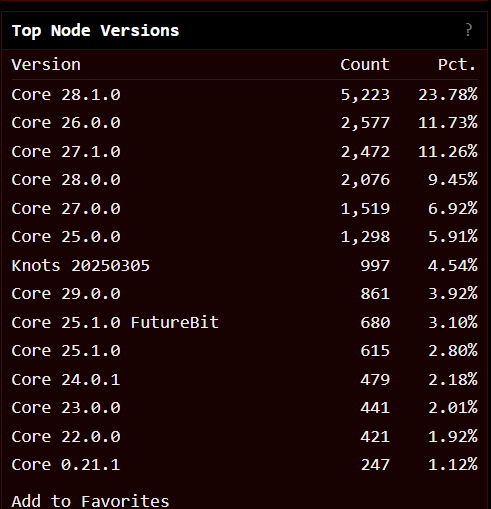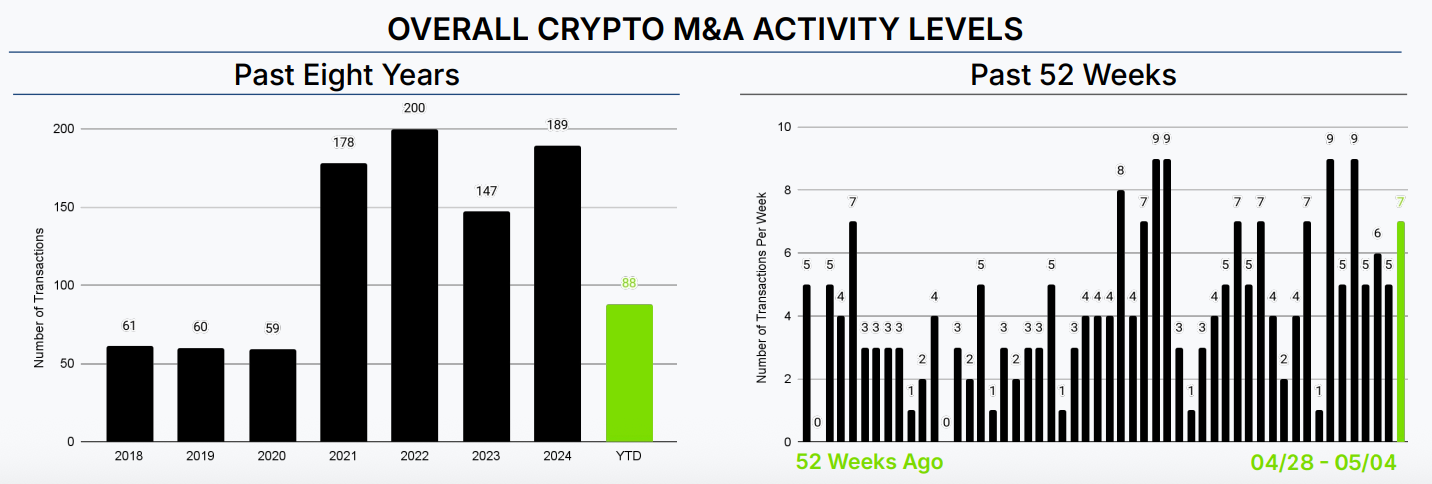Uncategorized
Bitcoin Developers Plan OP_RETURN Removal in Next Release

The debate over Bitcoin’s OP_RETURN heats up, as developers of Bitcoin Core – the most popular node software – said they plan to scrap OP_RETURN entirely in the next release.
The OP_RETURN limit is an 80-byte cap on the amount of arbitrary data that can be embedded in a Bitcoin transaction using a special, unspendable output field.
“Large-data inscriptions are happening regardless and can be done in more or less abusive ways,” said Core contributor and Engineer at Blockstream Greg Sanders, known as ‘instagibbs,’ in a post on Github announcing the removal. “The cap merely channels them into more opaque forms that cause damage to the network.”
The debate centered on whether lifting the 80-byte OP_RETURN limit promotes transparency and simplifies data use on Bitcoin, or whether it opens the door to abuse, spam, and a shift away from Bitcoin’s financial focus.
On Github, Sanders added that enforcing the cap has created perverse incentives pushing users to embed data in fake public keys or spendable scripts. Removing the limit, he argues, “yields at least two tangible benefits: a cleaner UTXO set and more consistent default behavior.”
Not everyone is convinced. Core developer Luke Dashjr has long viewed inscriptions and other data storage as spam, and warned in April 2025 that this change was “utter insanity.”
Amid the controversy, Bitcoin Knots, maintained by former Core developer Luke Dashjr, has seen growing adoption, hitting approximately 5% share of all nodes.

Bitcoin Knots, a more customizable fork of Bitcoin Core, appeals to users seeking greater control over what their nodes relay or store, including allowing users to reject non-payment transactions like inscriptions.
Some prominent thought leaders in the industry, like Samson Mow, are encouraging node operators not to upgrade their version of Bitcoin Core, or use Knots instead.
Sanders defended the removal of the cap as aligned with Bitcoin’s ethos: minimal, transparent rules.
“By retiring a deterrent that no longer deters,” he wrote, “Bitcoin Core lets the fee market arbitrate competing demands.”
But that isn’t bringing much consensus.
“This marks a fundamental shift in the direction of Bitcoin,” one commenter warned on GitHub.
«This is the largest mistake Core can make at this juncture,» another on Github added. “I want to be on the record saying that.”
Uncategorized
Solana’s Natix and Grab Team Up to Expand DePIN Mapping Into US, Europe

NATIX, a decentralized physical infrastructure network (DePIN) focused on mapping data on Solana, shared Tuesday that it is teaming up with taxi service Grab to provide more accurate mapping technologies.
Grab, which is known for its taxi services in southeast Asia but also crowdsources mapping data for its technological mapping arm, will be using its collaboration with NATIX to expand its footprint into the U.S. and Europe.
The partnership consists of the NATIX team using Grab’s hardware and software technologies for mapmaking. “We take care of the data collection side, and we essentially monetize this together,” said Alireza Ghods, the co-founder of NATIX to CoinDesk in an interview. “They’re buying the data that we generate to build their pipeline for the U.S. and for Europe. And on the other side, they’re giving us both their hardware technology as well as the AI technology that basically analyzes the images to build maps and map services like navigation.”
“We’re starting in the markets of the EU and US, where [Grab] is not present. So this is us combined with Grab, going for global expansion,” Ghods added.
DePIN is a blockchain-based system that crowdsources real-world infrastructure, like data collection, and verifies them through decentralized technologies. DePIN projects often appear in the Solana ecosystem thanks to the blockchain’s fast transaction speeds and low transaction costs.
NATIX is a project within Solana’s DePIN ecosystem that enables users to contribute street data and mapping visuals via smartphones. The crowdsourced data is then used to build decentralized maps, which can be leveraged by AI models, especially for autonomous driving and smart city applications. Users are also rewarded NATIX’s native token, $NATIX, for their contributions as a way to incentivize them to participate in the network.
“The reason that we actually did the collaboration is due to the power of DePIN combined with a very well established enterprise grade technology, » said Ghods. “I think it’s one of the few sectors in crypto that really, really makes sense.”
Read more: DePIN 2.0: What the Next Generation of DePINs Is Doing Differently
Uncategorized
IntoTheBlock and Trident Merge With $25M Backing to Build Institutional DeFi Gateway

Decentralized finance (DeFi) firms IntoTheBlock and Trident Digital have merged to form Sentora, joining forces to bring institutional investors onchain.
The new company, helmed by Anthony DeMartino, co-founder of Trident and former head of risk strategies at Coinbase (COIN), is also on track to close a $25 million founding round with New Form Capital leading the investment. Ripple, Tribe Capital, UDHC, Joint Effects also participated in the fundraising round, with further backing from strategic ecosystem investors including Curved Ventures, Flare and Bankai Ventures. While most investors have already closed the investment, two firms will close the process by June, the company told CoinDesk.
The merger comes at a time when DeFi is maturing from its «wild west» beginnings into a blockchain-based financial economy with offerings increasingly catered towards sophisticated investors.
It also underscores the ongoing trend of consolidation within the crypto industry. There were 88 mergers and acquisitions in the first four months of 2025, according to Architect Partners, putting this year on track to surpass the record years of 2022 and 2024.

Sentora combines IntoTheBlock’s track record in DeFi analytics—spanning over $3 billion in institutional deployments—with Trident’s experience structuring liquidity programs and financial products.
The platform aims to provide a one-stop shop for institutional investors, offering yield strategies, compliance, risk management and access to structured products all under one hood.
«The vision is to build all the core primitives that are needed for any institution whether it’s a crypto institution, DAO foundation, traditional finance investor or individual family office, to interact with DeFi in a way that feels intelligent, that feels safe, that feels secure,» Jesus Rodriguez, co-founder of IntoTheBlock and now CTO of Sentora, said in an interview with CoinDesk.
A key roadblock that has hindered asset managers entering DeFi at scale is that the space is getting increasingly complex and fragmented across new chains and protocols, DeMartino explained.
«It shouldn’t be this hard,» he said. «You shouldn’t have to learn about a new chain and learn about a whole bunch of different protocols and understand bridging and different wallets every time you want to go to a new chain.»
What can help bridge this gap and attract even traditional finance firms on-chain, according to DeMartino, is to abstract away from interacting with individual protocols with a single platform that handles all the risk management and liquidity, while keeping transparency about the underlying plumbing.
«DeFi rails are the future of finance, but it’s still a very small market,» he said. DefiLlama data shows that there are less than $130 billion of assets on DeFi protocols, dwarfed by the the multiple trillions of assets under management at the likes of BlackRock and Fidelity Investments.
«We’re building the rails for the next 130 trillion of assets to come onchain,» he said.
Read more: Beyond Incentives: How to Build Durable DeFi
Uncategorized
Florida Withdraws Strategic Bitcoin Reserve Bills From Consideration

Florida has withdrawn two bills related to the creation of a state-level strategic bitcoin (BTC) reserve.
House Bill 487 and Senate Bill 550 have been «indefinitely postponed and withdrawn from consideration,» according to the state Senate website. The two bills, which were both filed in February, sought to allow investment of public funds in BTC.
Florida joins numerous other states, such as Wyoming, Pennsylvania and Oklahoma, which have seen bills related to BTC investments fail to clear the legislative process, according to Bitcoin Laws. There are a string of other states with outstanding bills, most of which remain in the initial committee phase.
The most advanced state-level process to establishing a BTC reserve was in Arizona, where SB 1025 passed a House vote by 31-25 only to be vetoed by Governor Katie Hobbs. The bill proposed permitting the investment of seized funds into BTC.
There remains the related SB 1373, which would allow up to 10% of Arizona state funds to be allocated into digital assets. This bill has yet to reach a final vote.
Read More: Swiss National Bank Rejects Calls to Add Bitcoin Reserves
-

 Fashion7 месяцев ago
Fashion7 месяцев agoThese \’90s fashion trends are making a comeback in 2017
-

 Entertainment7 месяцев ago
Entertainment7 месяцев agoThe final 6 \’Game of Thrones\’ episodes might feel like a full season
-

 Fashion7 месяцев ago
Fashion7 месяцев agoAccording to Dior Couture, this taboo fashion accessory is back
-

 Entertainment7 месяцев ago
Entertainment7 месяцев agoThe old and New Edition cast comes together to perform
-

 Business7 месяцев ago
Business7 месяцев agoUber and Lyft are finally available in all of New York State
-

 Sports7 месяцев ago
Sports7 месяцев agoPhillies\’ Aaron Altherr makes mind-boggling barehanded play
-

 Entertainment7 месяцев ago
Entertainment7 месяцев agoDisney\’s live-action Aladdin finally finds its stars
-

 Sports7 месяцев ago
Sports7 месяцев agoSteph Curry finally got the contract he deserves from the Warriors





